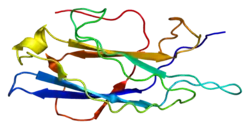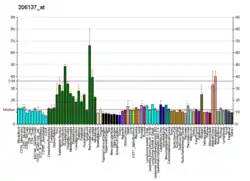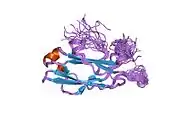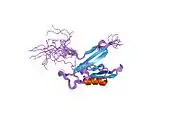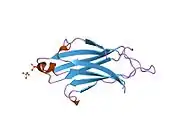RIMS2
Regulating synaptic membrane exocytosis protein 2 is a protein that in humans is encoded by the RIMS2 gene.[4][5][6]
References
- GRCm38: Ensembl release 89: ENSMUSG00000037386 - Ensembl, May 2017
- "Human PubMed Reference:". National Center for Biotechnology Information, U.S. National Library of Medicine.
- "Mouse PubMed Reference:". National Center for Biotechnology Information, U.S. National Library of Medicine.
- Nagase T, Ishikawa K, Suyama M, Kikuno R, Miyajima N, Tanaka A, Kotani H, Nomura N, Ohara O (April 1999). "Prediction of the coding sequences of unidentified human genes. XI. The complete sequences of 100 new cDNA clones from brain which code for large proteins in vitro". DNA Res. 5 (5): 277–86. doi:10.1093/dnares/5.5.277. PMID 9872452.
- Fukuda M (April 2003). "Distinct Rab binding specificity of Rim1, Rim2, rabphilin, and Noc2. Identification of a critical determinant of Rab3A/Rab27A recognition by Rim2". J Biol Chem. 278 (17): 15373–80. doi:10.1074/jbc.M212341200. PMID 12578829.
- "Entrez Gene: RIMS2 regulating synaptic membrane exocytosis 2".
- Sun, Lei; Bittner Mary A; Holz Ronald W (October 2003). "Rim, a component of the presynaptic active zone and modulator of exocytosis, binds 14-3-3 through its N terminus". J. Biol. Chem. United States. 278 (40): 38301–9. doi:10.1074/jbc.M212801200. ISSN 0021-9258. PMID 12871946.
- Shibasaki, Tadao; Sunaga Yasuhiro; Fujimoto Kei; Kashima Yasushige; Seino Susumu (February 2004). "Interaction of ATP sensor, cAMP sensor, Ca2+ sensor, and voltage-dependent Ca2+ channel in insulin granule exocytosis". J. Biol. Chem. United States. 279 (9): 7956–61. doi:10.1074/jbc.M309068200. ISSN 0021-9258. PMID 14660679.
- Kashima, Y; Miki T; Shibasaki T; Ozaki N; Miyazaki M; Yano H; Seino S (Dec 2001). "Critical role of cAMP-GEFII--Rim2 complex in incretin-potentiated insulin secretion". J. Biol. Chem. United States. 276 (49): 46046–53. doi:10.1074/jbc.M108378200. ISSN 0021-9258. PMID 11598134.
- "Protein unc-13 homolog A". UniProt.
Further reading
- Andersson B, Wentland MA, Ricafrente JY, et al. (1996). "A "double adaptor" method for improved shotgun library construction". Anal. Biochem. 236 (1): 107–13. doi:10.1006/abio.1996.0138. PMID 8619474.
- Yu W, Andersson B, Worley KC, et al. (1997). "Large-scale concatenation cDNA sequencing". Genome Res. 7 (4): 353–8. doi:10.1101/gr.7.4.353. PMC 139146. PMID 9110174.
- Fenster SD, Chung WJ, Zhai R, et al. (2000). "Piccolo, a presynaptic zinc finger protein structurally related to bassoon". Neuron. 25 (1): 203–14. doi:10.1016/S0896-6273(00)80883-1. PMID 10707984. S2CID 10177138.
- Kashima Y, Miki T, Shibasaki T, et al. (2002). "Critical role of cAMP-GEFII--Rim2 complex in incretin-potentiated insulin secretion". J. Biol. Chem. 276 (49): 46046–53. doi:10.1074/jbc.M108378200. PMID 11598134.
- Strausberg RL, Feingold EA, Grouse LH, et al. (2003). "Generation and initial analysis of more than 15,000 full-length human and mouse cDNA sequences". Proc. Natl. Acad. Sci. U.S.A. 99 (26): 16899–903. Bibcode:2002PNAS...9916899M. doi:10.1073/pnas.242603899. PMC 139241. PMID 12477932.
- Wang Y, Südhof TC (2003). "Genomic definition of RIM proteins: evolutionary amplification of a family of synaptic regulatory proteins( small star, filled )". Genomics. 81 (2): 126–37. doi:10.1016/S0888-7543(02)00024-1. PMID 12620390.
- Sun L, Bittner MA, Holz RW (2003). "Rim, a component of the presynaptic active zone and modulator of exocytosis, binds 14-3-3 through its N terminus". J. Biol. Chem. 278 (40): 38301–9. doi:10.1074/jbc.M212801200. PMID 12871946.
- Shibasaki T, Sunaga Y, Fujimoto K, et al. (2004). "Interaction of ATP sensor, cAMP sensor, Ca2+ sensor, and voltage-dependent Ca2+ channel in insulin granule exocytosis". J. Biol. Chem. 279 (9): 7956–61. doi:10.1074/jbc.M309068200. PMID 14660679.
- Brandenberger R, Wei H, Zhang S, et al. (2005). "Transcriptome characterization elucidates signaling networks that control human ES cell growth and differentiation". Nat. Biotechnol. 22 (6): 707–16. doi:10.1038/nbt971. PMID 15146197. S2CID 27764390.
- Suzuki Y, Yamashita R, Shirota M, et al. (2004). "Sequence comparison of human and mouse genes reveals a homologous block structure in the promoter regions". Genome Res. 14 (9): 1711–8. doi:10.1101/gr.2435604. PMC 515316. PMID 15342556.
- Gerhard DS, Wagner L, Feingold EA, et al. (2004). "The status, quality, and expansion of the NIH full-length cDNA project: the Mammalian Gene Collection (MGC)". Genome Res. 14 (10B): 2121–7. doi:10.1101/gr.2596504. PMC 528928. PMID 15489334.
- Gérard HC, Whittum-Hudson JA, Schumacher HR, Hudson AP (2006). "Synovial Chlamydia trachomatis up regulates expression of a panel of genes similar to that transcribed by Mycobacterium tuberculosis during persistent infection". Ann. Rheum. Dis. 65 (3): 321–7. doi:10.1136/ard.2005.042226. PMC 1798071. PMID 16192289.
- Olsen JV, Blagoev B, Gnad F, et al. (2006). "Global, in vivo, and site-specific phosphorylation dynamics in signaling networks". Cell. 127 (3): 635–48. doi:10.1016/j.cell.2006.09.026. PMID 17081983. S2CID 7827573.
This article is issued from Wikipedia. The text is licensed under Creative Commons - Attribution - Sharealike. Additional terms may apply for the media files.
